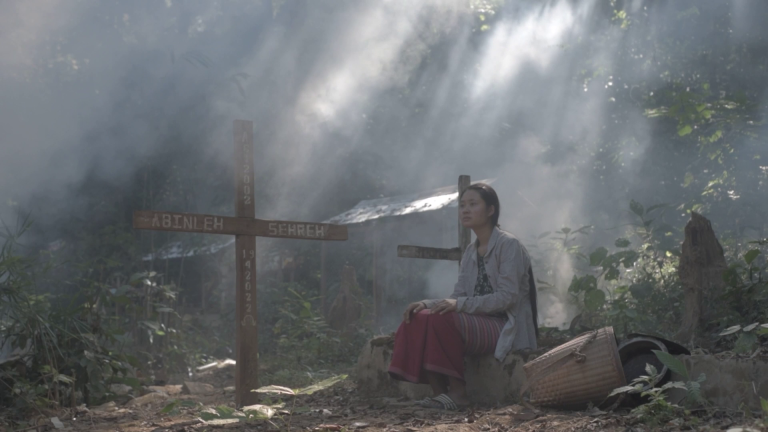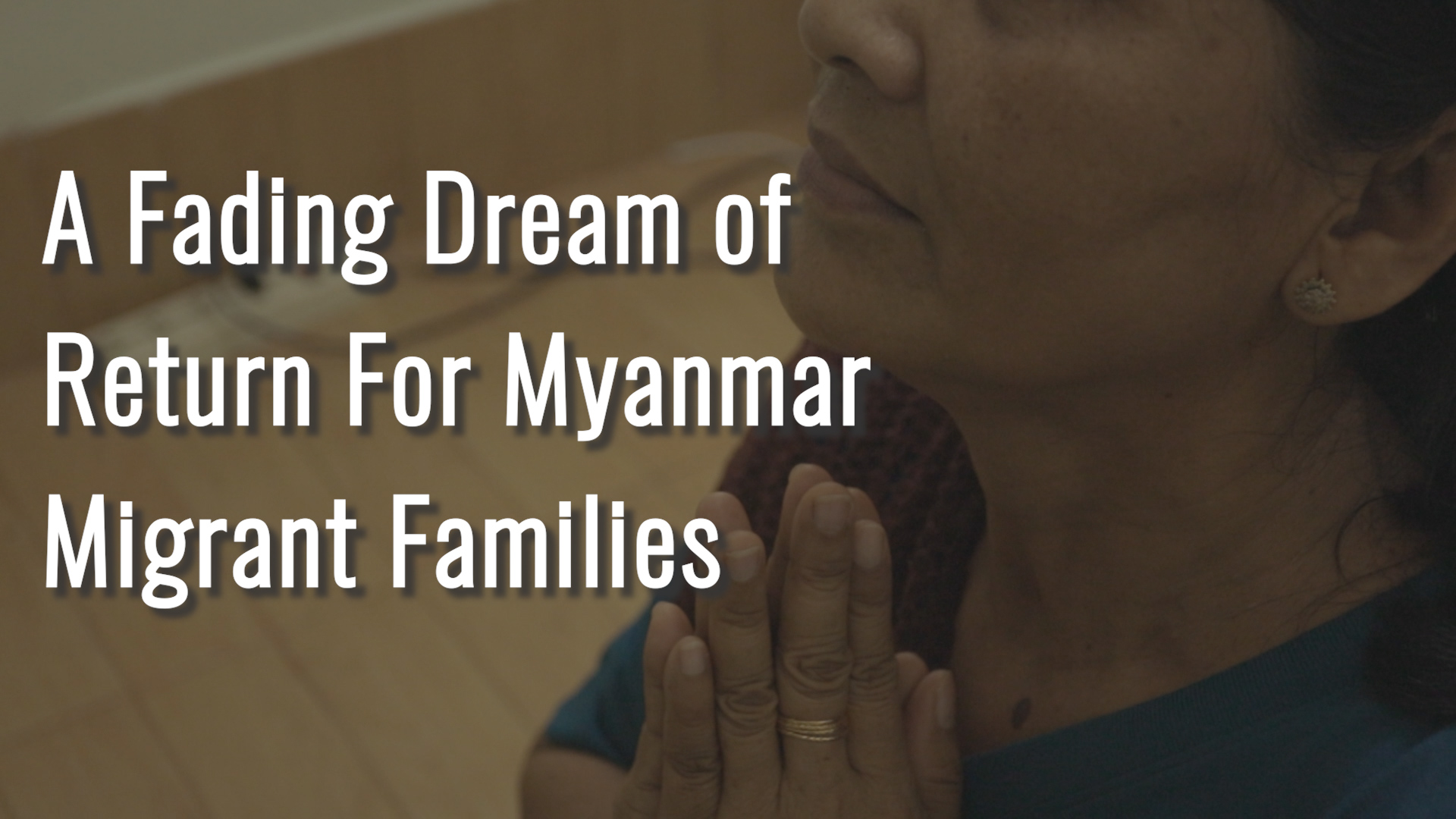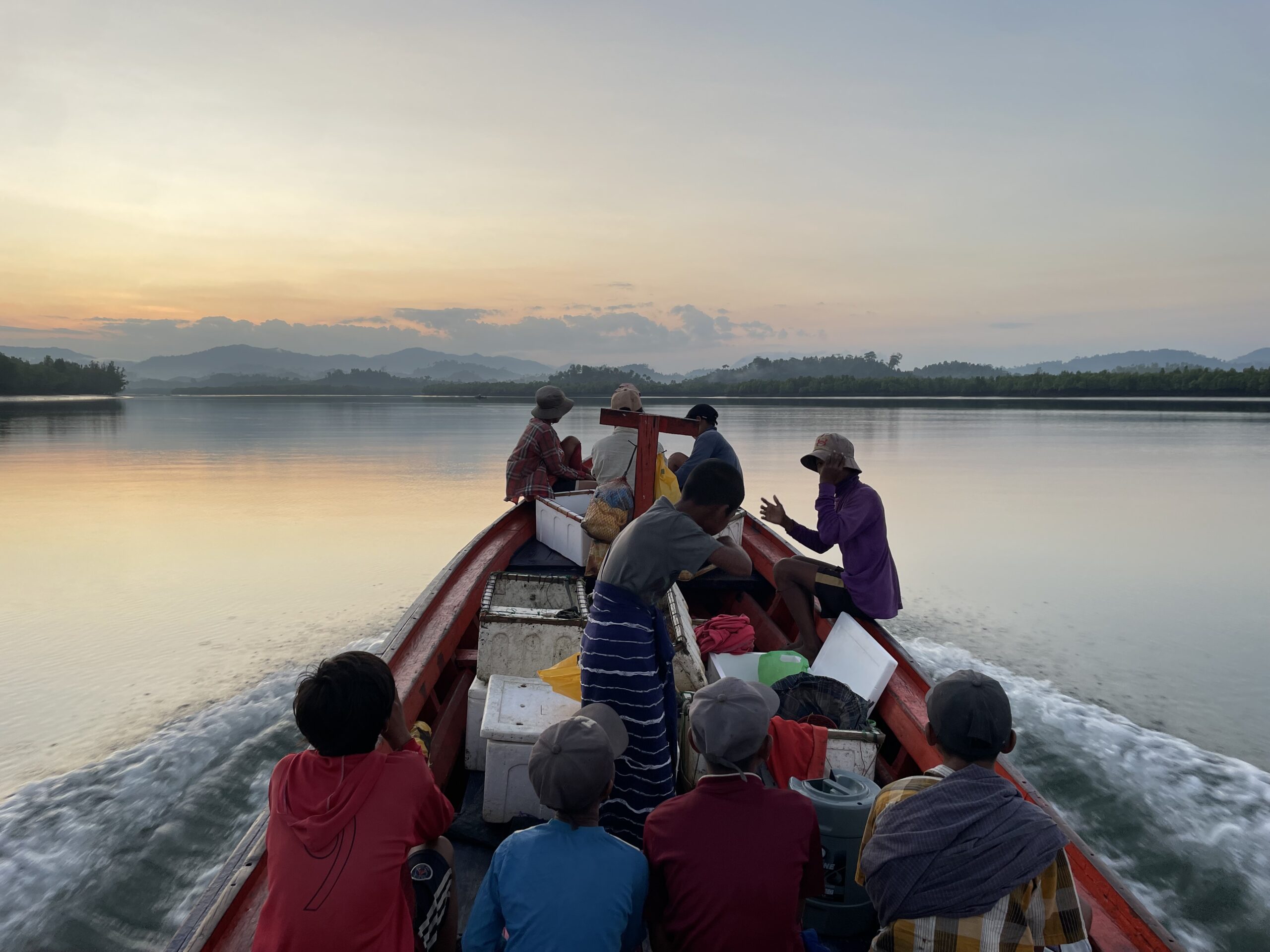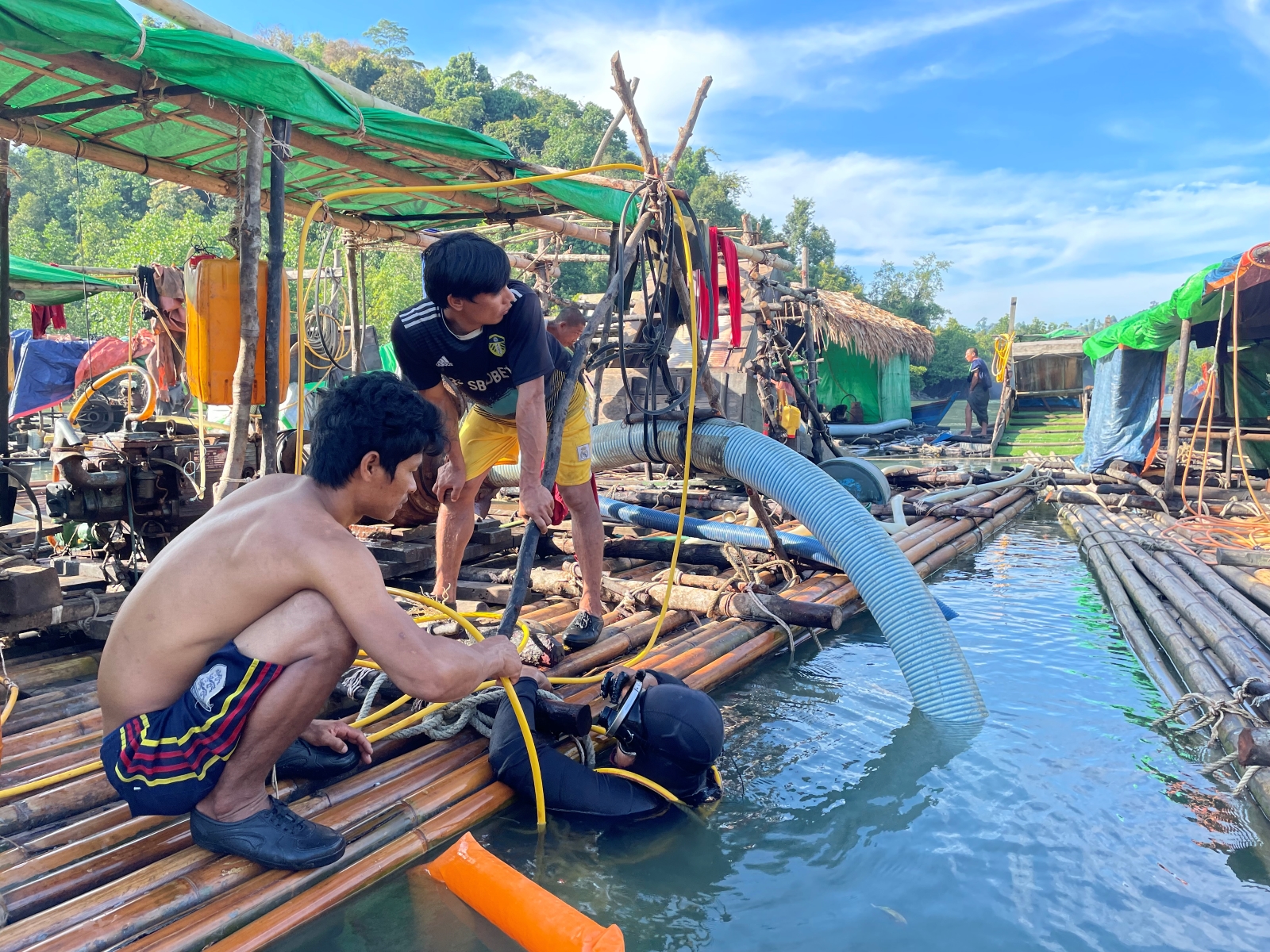OPINION
The military regime needs foreign allies to survive, but as gas and other resources dry up, it has little to offer them in return.
By GUILLAUME DE LANGRE | FRONTIER
“We don’t care about sanctions, we have so many natural resources,” went the catchy song Myanmar Spirit, broadcast by Myanmar’s former military regime in the 1990s. As one of the world’s most sanctioned organisations, the military has long used natural resources as its get-out-of-jail-free card. But when the United States expanded sanctions to cover two state-owned banks and the military’s jet fuel supplies in June this year, Myanmar’s new junta suddenly seemed to care a great deal.
The regime quickly reshuffled its cabinet, dispatched its foreign minister to Bangkok and allowed the Thai foreign minister to visit Daw Aung San Suu Kyi in prison – the first time a foreign diplomat had been granted access to the ousted state counsellor since her arrest in the 2021 coup. The junta also slightly reduced her sentence and detained two dozen bureaucrats suspected of leaking their sanctions-evasion plan. Civil servants I had worked with in Nay Pyi Taw, as an advisor to the energy ministry before the military takeover, described a wind of panic blowing across the capital. In particular, one spoke of “total chaos” at the Myanma Oil and Gas Enterprise.
After almost three years in power, reality is dawning on the junta. The coup interrupted the commodity boom that began in the 1990s, as well as the investment that came with the country’s failed transition to democracy, starting in 2011. As Myanmar’s creditors start to call in debts and the national currency plummets, the generals need allies more than ever. But they have little to offer in return, raising questions about the regime’s ability to maintain alliances, circumvent sanctions and stay financially afloat.
The military has since the 1990s relied on three main partners to weather sanctions: Singapore for banking, Thailand for gas exports and China for other commodity exports and infrastructure development. In return, these three countries have benefited from Myanmar’s natural resource exports and investment opportunities. But the political and economic mayhem unleashed by junta chief Senior General Min Aung Hlaing and his acolytes has changed that dynamic. Singapore, Thailand and especially China have all signalled that Myanmar is becoming a liability. This leaves Nay Pyi Taw more isolated and exposed to sanctions than it has been in decades, unable to fund itself, buy support and weapons, or even provide basic government services.
Singapore has long been the preferred overseas banking destination for Myanmar’s government, as well as its political and economic elites. Currently, 67 percent of the Central Bank of Myanmar’s foreign reserves are held in Singaporean banks. The island nation once provided protected channels for Myanmar to receive payment for natural resource exports, but as Myanmar opened up from 2011, Singapore also became its top source of foreign direct investment. But the winds are shifting: Singaporean regulators are cracking down on money laundering, while Minister of Foreign Affairs Vivian Balakrishnan opposes normalising relations with the Myanmar junta. In a bold move, Singapore’s third-biggest bank, United Overseas Bank, halted all transactions to and from Myanmar-held accounts on September 1.
While the Myanmar military has kept its riches in Singapore, Thailand has helped to generate this wealth. The country has purchased 57pc of Myanmar’s natural gas exports since they began in 2001. But with Myanmar’s gas reserves nearing depletion and all investment in the sector frozen since 2021, the Thai-Myanmar energy relationship is not as symbiotic as it once was. In 2007, Thailand depended on gas from Myanmar to meet around one-third of its demand. By last year, that figure had dropped to 15pc, and it will continue to decline as the country shifts from Myanmar gas to liquefied natural gas imports from across the world. Thailand’s national oil and gas company had intended to develop new gas fields in Myanmar, but this plan was shelved after the coup.
China has also been a major importer of Myanmar natural gas. But as China’s economy has grown in recent decades, so has its demand for other commodities such as copper, tin, jade, gold and timber that also provide vital income for the Myanmar military. Meanwhile, the poorer, landlocked parts of southwestern China have looked to Myanmar as a promising market for their infrastructure, energy and trading firms, helping them close the gap with the rich coastal provinces.
When Chinese President Xi Jinping visited Myanmar in January 2020, Chinese investors planned to plough billions of dollars into infrastructure projects. Meanwhile, copper and tin production was booming, and offshore gas exploration was in full swing.
More than three years later, the picture looks very different. Myanmar’s resistance forces frequently target oil and gas pipelines to China, while all new oil and gas exploration and development has stopped. Copper exports to China plummeted by 94pc from 2020 to 2022 as fighting raged in Sagaing Region. Besides copper, the region also contains Myanmar’s largest nickel mine, run by a Chinese state-owned enterprise, which had to stop production after resistance forces blew up the mine’s power lines. Meanwhile, the reopening of one of the country’s most productive silver, lead and zinc mines has been postponed following the exit of Western firms, and a major lithium exploration project has been halted. As Frontier reported last year, all this has contributed to an 80pc drop in earnings from mining exports between 2020 and 2022.

Many of the areas in Myanmar where resource extraction has increased since the coup are controlled or contested by armed resistance groups. In an attempt to stem funds for the resistance, the junta banned thousands of artisanal wells from extracting oil in central Myanmar. Meanwhile, the United Wa State Army, the main supplier of small arms to the junta’s enemies, produced over two thirds of China’s tin imports until the group suddenly suspended production on August 1.
As for Chinese-backed infrastructure projects, only five small solar plants and one minor gas plant have moved forward since the coup, while dozens of power plant projects have been cancelled and six existing Chinese-owned power plants have shut down. Two flagship projects announced by the junta in 2021 to lure Chinese investors, the Hatgyi dam in Kayin State (US$2.6 billion) and the Mee Laung Gyaing gas plant in Ayeyarwady Region ($2.5 billion), have not moved an inch since then. In Rakhine State’s Kyaukphyu Township, long-delayed Chinese plans for a deep-sea port and special economic zone are also in doubt following a 50pc cut in the state’s power supply.
Meanwhile, almost all Chinese infrastructure firms that had bet big on Myanmar before the coup have left the country. The largest power production company, Hong Kong-listed VPower, cut its power capacity by 92pc following eye-watering losses and is moving its power plants elsewhere. Only a handful of Chinese state-owned enterprises remain, pushing small projects and laying the groundwork for better days. Chinese banks and insurers are not in the mood for big, risky moves when the country is so unstable – and when the junta’s capital controls trap any profits made in a currency that keeps depreciating.
As a result, China’s priorities in Myanmar have gone from ramping up extraction and construction to shielding itself politically and financially from the instability in the country. For the past year, the Bank of China has withheld more than $500 million in delayed payments for Myanmar natural gas, while there have reportedly been concerns about the junta’s ability to repay three loans worth a combined $400 million from China’s Export Import Bank. Beijing has also made diplomatic efforts to stabilise its border with Myanmar by engaging with ethnic armed organisations, while also cracking down on scam operations that target Chinese nationals or traffic them as workers.
More broadly, the coup has bored a hole into Myanmar’s economy. A country that depends on natural gas for half of both its power supply and hard currency has cancelled or postponed all new gas development projects. Gas production is now expected to fall by 75pc from today’s levels by 2030, with no backup plan. For many people in Myanmar, the coup has become synonymous with the return of lengthy power cuts; in August, Min Aung Hlaing admitted that the regime could not meet even half of the country’s power demand. In an unpublished survey of Myanmar industrial zones that I assisted in May, one-third of companies said that the power cuts are an existential threat to their businesses. The World Bank, meanwhile, has said Myanmar’s overall power supply could decline by a further 25pc by 2030, bringing it back to levels not seen for more than a decade.
In short, the extractive system that has been central to Myanmar’s politics, diplomacy and economy since the 1990s is breaking down. Min Aung Hlaing’s policies and speeches point to a supposed golden age in the late 2000s and early 2010s, but they neglect to mention that those were the days of peak gas production and, from 2011, global interest in Myanmar’s opening markets. Unlike former dictator Senior General Than Shwe, Min Aung Hlaing cannot rely on natural resources to weather sanctions, fund the state and buy support at home and abroad.
What happens next is highly uncertain, but the status quo cannot hold. Every scenario that is favourable to the military requires large-scale material support by an external partner, but few seem interested. For all the talk of China or Russia using the coup to increase their influence in Myanmar, they have made no substantial moves. Left isolated, the junta may try to retain power at all costs while the country fragments, but resource scarcity will likely exacerbate factionalism within the military. Myanmar used to belong to a group of sanctioned but resource-rich countries, like Iran, Venezuela and Russia. Now it is falling into the category of formerly resource-rich countries that conflict has turned resource-poor, fragile and fragmented. Think Libya, Syria or Yemen.
This new fragility makes the military more vulnerable to influence, coercion and sanctions than it has ever been. Based on the junta’s diplomatic frenzy since June, the western sanctions on banks, jet fuel and the state-owned oil and gas company are having an effect, but they must be implemented strictly and aggressively to work as they should. Myanmar’s neighbours must also understand that in a cold, hard sense, the military is running out of the resources that undergird its political power. If you loan the generals money, you will not be repaid. If you have ongoing contracts with them, they will try to renegotiate the terms. If you allow them to use your currency, they will degrade its value. They announce with great pomp a new power plant, pipeline or port, but after three years of butchering Myanmar’s economy, you would be hard-pressed to find a major investor who believes anything they say.
The regime’s resource plight also creates a political window of opportunity. For those who fight against it, a military strapped for cash, weapons, fuel and spare parts is easier to take on. For those who talk and negotiate, it is an incentive to revive backchannel diplomacy with important neighbours. Finally, for those planning for the future, it is an opportunity to reimagine Myanmar’s economy based on two unassailable facts. First, the 30-year export-oriented gas boom is over. Second, the most powerful ethnic armed organisations have more guns, land, and resources than they’ve had in decades. These groups can (and will) impose a change in how natural resources are managed and distributed. Myanmar will have to become less centralised and more federal, less extractive and more productive. Before the coup, these were political debates. Today, they are preconditions to governing the country.
Myanmar’s generals are right to be worried as the ground shifts under their boots. Singapore is giving the regime the cold shoulder, Thailand is rerouting its energy supply from Myanmar and China wants more stability, while the coup has dramatically weakened the economic foundations of the military’s power.
In early November, I talked to a source in Nay Pyi Taw who had never criticised the junta, and asked them why lengthy power cuts were starting so soon before the hot-season peak starting in March. They replied, “What is worse than ‘fragile state’?” “Failed state?” I suggested. “Yes,” they said.
Guillaume de Langre is a former adviser to Myanmar’s Ministry of Electricity and Energy. He is currently a PhD candidate at the University of Oxford, researching climate change and state fragility.







